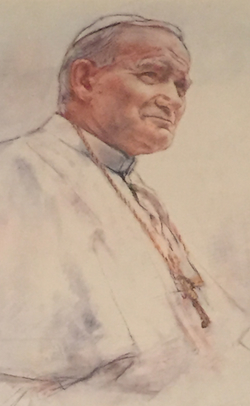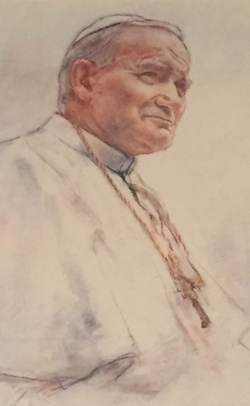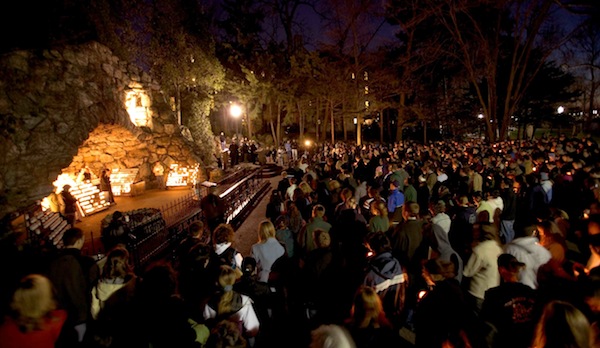Daily Gospel Reflection
Join the Notre Dame family of faith. Receive God’s Word and a unique reflection in your inbox each day.
October 22, 2024
Jesus said to his disciples:
“Gird your loins and light your lamps
and be like servants who await their master’s return from a wedding,
ready to open immediately when he comes and knocks.
Blessed are those servants
whom the master finds vigilant on his arrival.
Amen, I say to you, he will gird himself,
have them recline at table, and proceed to wait on them.
And should he come in the second or third watch
and find them prepared in this way,
blessed are those servants.”
In this reading from Luke, Jesus stresses the importance of being prepared and vigilant. The imagery that he uses reminds us to live in a constant state of readiness. This is not just an admonition for the end of our time on earth and is not meant to exacerbate our own self-focused performance anxiety. It is to know and to act on the opportunities when God might call upon us.
In honor of the feast day of Pope John Paul II (today), let us reflect on his words, “The future starts today, not tomorrow.” John Paul II highlights the importance of taking action and overcoming procrastination. Truly, the only way to live by these words is by living with readiness and ambition to follow God’s call. We ought to seize every moment and every opportunity that God presents us with.
Towards the end of today’s passage, Jesus tells his disciples to be vigilant “in the second or third watch.” Living in preparation, readiness, and seizing opportunities requires patience and fortitude. Regardless of the hour or our temptations, our spiritual vigilance should not wane. Finally, Jesus says the master will gird himself and proceed to wait on the servants. Readiness and faithfulness are not just duties of a Catholic life but are ultimately met with grace and reward from God.
This passage causes us to ask ourselves: how are we keeping our own “lamps lit” through our habits of prayer, service, and faithfulness? Which distractions or temptations do we face that cause us to lose our attentiveness to God’s call? And by the inspiration of this passage and Pope John Paul II, whom we celebrate today, how can attentiveness cause an urgency to act as God calls us rather than postpone our preparation or good works for the future?
Prayer
Compared to what you have done for me, Abba, everything I can do for others is a mere pittance. Yet it means so much to you, and does so much in bringing about the fullness of your kingdom. I ask of your Spirit this day the grace to “wait on someone.” A smile, a kind word, yielding on the street or in the meeting room, making peace with someone whom I’ve been holding at arm’s length, forgiving someone who has hurt me—whatever you ask me to do, may I have the grace to do it. Amen
Saint of the Day

Pope John Paul II helped define the Church’s engagement with the world after the Second Vatican Council. His abundant charisma was matched only by his immense intellectual gifts, which he put at the service of fighting for human dignity and freedom. As the turmoil of the twentieth century gave way to the twenty-first, John Paul II fought to keep Christ the center of the human race's yesterday, today, and tomorrow.
Karol Jozef Wojtyla was born in Wadowice, Poland to a faithful Catholic family. Tragically, the young Karol was an orphan by the time he was twenty-one, having lost his mother, father, and his older brother. During World War II, during oppressive Nazi occupation, Karol enrolled in an underground seminary in Krakow and ran a resistance movement of artists. After the war ended, Karol was ordained a priest in 1946. He was sent for further education in Rome, to study at the Angelicum under the tutelage of a famous French Dominican theologian Fr. Garrigou-Lagrange.
The Communist regime that occupied Poland after World War II kept an eye on the brilliant young priest but underestimated him as a harmless intellectual. Thus, they allowed his appointment as an auxiliary bishop of Krakow in 1958. Karol attended sessions of the Second Vatican Council and contributed significantly to the ecumenical discussion. The experience of the council changed him and deepened his commitment to renewing the Church. He was named archbishop of Krakow in 1964, elevated to a cardinal in 1967, and provided leadership to the faithful of Poland as they faced persecution under Communist rule.
When Pope Paul VI died on August 6, 1978, Wojtyla went to Rome to elect a new pope. The cardinals elected Cardinal Albino Luciani of Venice, who took the name John Paul to honor the two popes who preceded him and who had guided the Second Vatican Council (John XXIII and Paul VI) . When Pope John Paul died after 33 days in office, the cardinals gathered once again, and this time, they elected Wojtyla, who took the name John Paul II as a symbol of continuity. He was the first non-Italian elected as Supreme Pontiff in 455 years.
When he stepped out onto the balcony facing St. Peter’s Square, his first words were these:
"Be not afraid! Open up—no, swing wide the gates to Christ. Open up to his saving power the confines of the state, open up economic and political systems, the vast empires of culture, civilization and development... Be not afraid!"
In the midst of the trauma of the second half of the twentieth century, and in the wake of great changes in the Church in the Second Vatican Council, there was a deep need for a wise leader to guide the Church and the world through the chaotic decades of rapid change. John Paul II ministered to Catholics in Soviet Bloc countries and continued to expand the pastoral reach of the papacy into the global South and East. Aided by immense energy and unflagging evangelical enthusiasm, John Paul II traveled on apostolic journeys to 124 countries.
Like his predecessors, John Paul II worked to promote ecumenical and interfaith initiatives. In order to dialogue with the youngest members of the Church, John Paul II inaugurated the World Youth Day celebrations. A prolific writer and intellect, John Paul II wrote fourteen encyclicals and five books. Heeding Vatican II's call to highlight the universal call to holiness, John Paul II canonized 482 saints. The charismatic artist from Krakow became a world-famous evangelist, defender of human rights, a peacemaker, and a prophet reminding a world depressed by its own evil to rediscover the endless and indefatigable joy of Christ.

In his later years, John Paul II struggled with Parkinson’s disease. Even though Parkinson's made it difficult for him to celebrate Mass and eventually impacted his mobility, John Paul II did not shy from his public pastoral duties. Thus, John Paul II presented himself to the world as an image of the great humility and dignity of a suffering human being. When John Paul II died in the spring of 2005, the Notre Dame campus community gathered at the Grotto to pray for him and the Church—the image below captures that moment.

Pope John Paul II was beatified in 2011 and was canonized a saint on April 27, 2014, along with Pope John XXIII.
At the University of Notre Dame, John Paul II has been honored by several initiatives and monuments. The Center for Ethics and Culture honors leaders who promote the Gospel of Life with its Evangelium Vitae Medal, which they named after John Paul II’s landmark 1995 encyclical. The image of John Paul II shown above hangs in the Basilica of the Sacred Heart's museum on campus, which also displays several of his white papal zucchettos (the small caps worn by bishops), one of which is pictured below.

Saint Pope John Paul II, who taught us to be not afraid as we open wide the doors to Christ—pray for us!
To learn even more about Saint Pope John Paul II, watch this video lecture from the McGrath Institute for Church Life at the University of Notre Dame.

